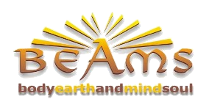Profesional Training
NO DIPLOMA COURSES (Anatomy & Physiology, or Reflexology) ARE CURRENTLY SCHEDULED FOR 2021
SEE DATES / EVENTS FOR OTHER TRAINING AVAILABLE.
HOLISTIC REFLEXOLOGY DIPLOMA COURSE REFLEXOLOGY
Reflexology is a method of encouraging the body’s natural healing ability by working on the reflex areas of the hands and feet. The practitioner uses thumbs and fingers. This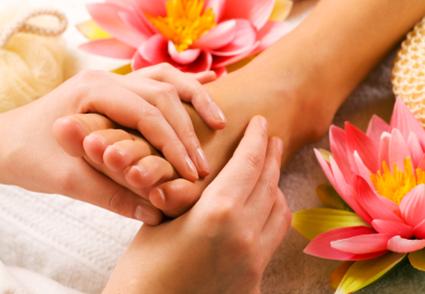 safe effective therapy is one of the fastest growing and best established of the complementary therapies. THE REFLEXOLOGY SCHOOL B.E.A.M.S. Holistic Therapy College is the longest established School of Reflexology in the West, originally founded in 1988.
safe effective therapy is one of the fastest growing and best established of the complementary therapies. THE REFLEXOLOGY SCHOOL B.E.A.M.S. Holistic Therapy College is the longest established School of Reflexology in the West, originally founded in 1988.
ENTRY REQUIREMENTS
- Candidates must have reached 18 years of age.
- Undertake the Anatomy & Physiology Course or
- Allowance MAY be given where people have previous qualifications in Anatomy & Physiology Evidence of qualifications will be required.
- Be able to communicate verbally and in writing
- Be able to use their hands in a practical way.
COURSE CONTENT
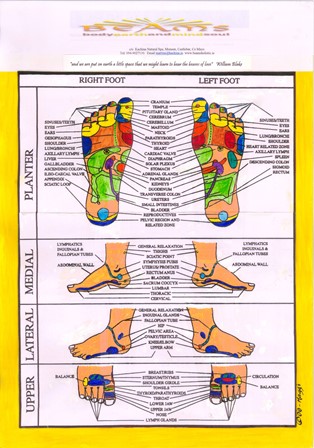 The aim of the course is to provide participants with the necessary theory and skills to practice as Professional Reflexologists. Emphasis is placed on the ability to identify and work on reflex points of the feet systematically and with skilled pressure to bring about a state of relaxation, a sense of well-being, improvement of nerve function, lymph and blood supply, excretion of toxins from the body, and balance and harmony to the whole being. The inter-connectedness of body, feelings, mind and soul and their acknowledgement when treating clients, is an integral aspect of training.
The aim of the course is to provide participants with the necessary theory and skills to practice as Professional Reflexologists. Emphasis is placed on the ability to identify and work on reflex points of the feet systematically and with skilled pressure to bring about a state of relaxation, a sense of well-being, improvement of nerve function, lymph and blood supply, excretion of toxins from the body, and balance and harmony to the whole being. The inter-connectedness of body, feelings, mind and soul and their acknowledgement when treating clients, is an integral aspect of training.
Candidates are also encouraged to become aware of the necessity for positive self awareness and to be able to utilize their own personal resources. Telephone / e-mail support is available for any situations that may arise as learners progress with their study. Current requirements for a reconised Reflexology comprise:
- Reflexology therapy: principles and practice
- Complementary Therapies: principles and practice
- Anatomy, Physiology & Pathology for complementary therapies
- Business Practice for complementary therapies
- Healthy Eating and Wellbeing
The main textbook used is “Reflexology - A Practical Approach” by Vicki Pitman with Kay MacKenzie. Published by Stanley Thornes.
REFLEXOLOGY THERAPY: PRINCIPLES AND PRACTICE This Unit focuses on all the theoretical and practical aspects needed to provide professional Reflexology treatments to members of the public and includes:
TECHNIQUES AND TREATMENTS
- Professional Practice as applicable to Reflexology
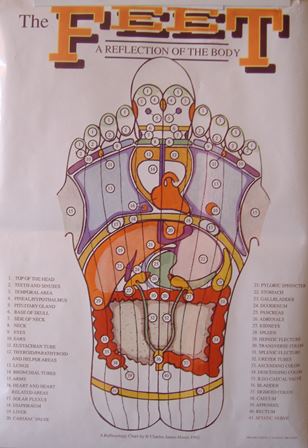
- Guidelines for setting up a preparing to give treatments
- Professional ergonomic advice; to avoid strain and enhance client comfort
- Visual and tactile assessment techniques; to assess the condition of feet or hands
- Range of relaxtion techniques, and use of thumb and fingers within a clear sequence for foot reflexology and also hands.
- Additional treatment and focus points to enhance individual treatments
- Adaption of treatments to suit individual needs
- How to support treatments and promote health; thchniques for self-help.
CASEWORK AND CLINICS A total of 40 documented treatments (made up of case studies and documented treatments) are required to be submitted as part of your training programme and form an important part of your overall requirements to obtain a diploma at the end of the course. A format will be given on how to approach the case studies. Case studies are monitored as you carry them out to allow for required standard to be reached. Learners will need to show evidence of having carried out a minimum of 100 treatment sessions, during their training. Treatments will comprise supervised clinic sessions and treatments completed outside class time.
REFLECTIVE PRACTICE Learners will be asked to reflect on their experience of giving and receiving treatments and identify areas for their own on-going learning and development.
COMPLEMENTARY THERAPIES: PRINCIPLES AND PRACTICE This Unit explores the principles of complementary therapies. Learners will gain an appreciation for other Complementary therapies.
PROFESSIONAL PRACTICE
- becoming a therapist - qualities and skills to be developed
- communication skills and the consultation process; record keeping o responsibilities of the therapist: cautions, contraindications; when to refer
- Health and Safety practice for Complementary Therapies
HISTORY AND THEORY
- origins and background; how Reflexology and other therapies have developed
- aims, principles and techniques used; how different therapies are believed to work
- an understanding of Reflexology 'maps' or charts of the hands and feet
- discussion of different approaches; meridian theory, 'subtle energy' theory o what is meant by the (w)holistic approach; psycho-physical aspects of health.
DEVELOPMENT OF COMPLEMENTARY THERAPIES
- professional associations; legal issues; codes of practice and ethics

- recognition, regulation and registration; advances in training and standards
ANATOMY, PHYSIOLOGY & PATHOLOGY
This Unit covers the knowledge of anatomy, physiology and pathology necessary for working as a Complementary therapist, including:
- a thorough understanding of the body systems
- how the body works as an integrated whole
- pathology: how to understand work with a wide range of disorders
BUSINESS PRACTICE This Unit focuses on the wide range of skills needed to plan, advertise and establish a successful practice as a Complementary therapist. It includes advice on: o legal and insurance requirements o working models; employment opportunities; self-employment o business plans; book-keeping guidelines & tax returns o marketing & publicity; ethical practice and advertising standards
HEALTHY EATING & WELL-BEING This Unit teaches a level of nutritional awareness appropriate for the complementary therapist. It will enable the therapist to evaluate a client’s eating habits and to offer basic dietary advice. It includes knowledge of:
- The importance of a balanced diet
- The role of essential nutrients, water and fibre for health
- Modern methods of food production & their impact on health
- Advising clients on adopting healthy eating and well-being habits This unit is recommended by the Awarding Body, to further client skills in practice.
ASSESSMENT The units that make up the Level 3 UK, Level 5 Ireland, Diploma in Reflexology are assessed internally and are subject to internal verification and external moderation. Learners' progress and development throughout the training, as well as assigned coursework and casework, will form an important part of their final assessment. There will be on-going  learning checks and tutorials to assist learning. Final assessments of all Units must meet the required standards to gain a ‘pass’ and learners need to achieve a ‘pass’ in all Units. There will be three supervised practical assessments. The final theory assessment will be made up of presented portfolio work – and a theory examination. Learners should aim to attend all classes. Individuals learn at different rates and the tutor will advise if extra time or study is needed. Missed or additional classes will usually need to be made up at the learner’s expense.
learning checks and tutorials to assist learning. Final assessments of all Units must meet the required standards to gain a ‘pass’ and learners need to achieve a ‘pass’ in all Units. There will be three supervised practical assessments. The final theory assessment will be made up of presented portfolio work – and a theory examination. Learners should aim to attend all classes. Individuals learn at different rates and the tutor will advise if extra time or study is needed. Missed or additional classes will usually need to be made up at the learner’s expense.
The ABC Level 3 Diploma in Reflexology will be awarded when all aspects of the course have been successfully completed. Learners are required to take out learner insurance while they are studying. They can obtain membership/insurance from the Association of Reflexologists (AoR), totalling approximately £25.00. This also gives access to the services offered while training. This would also allow a smooth transition, from learner to full membership status, following completion of the course, should the learner choose this. If the learner is already insured to practice a therapy, it may be possible to ‘add-on’ cover for learning reflexology.
HOME STUDY
- Learners should set aside a minimum of 5 hours per week for home study, to consolidate what has been learned and to complete home study assignments. Course notes and practice worksheets are provided and learners will be given details of required and recommended reading.
- Learners should also allow time to practise giving treatments to friends and/or family: These will be presented in the form of Case Studies, Clinic Notes and Practice Hours. Learners should allow a minimum of 3 hours /week to cover this initially.
- The 3 Supervised practical sessions will be written up and presented as Client Studies. These sessions are arranged within class times; writing-up the studies takes place outside class time.
RECOGNISED PRIOR LEARNING (RPL) Courses are designed to be flexible, allowing for an ease of transferable skills, where learners have already studied one or more of the Units. This will apply to those who have, for instance, studied Anatomy, Physiology & Pathology to Level 3, with one of the recognised awarding bodies: C&G, VTCT, ABC Awards or ITEC, from 2011 onwards. BEAMS will advise on what knowledge or skills may be ‘transferred’ on an individual basis, and make recommendations as to classes that would need to be attended and evidence that would need to be provided, for the Level 3 Diploma Uk, Level 5 Eire, in Reflexology course.
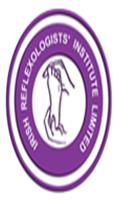 REFLEXOLOGY QUALIFICATION Learners undertake:
REFLEXOLOGY QUALIFICATION Learners undertake:
- Three full practical treatments on a client unknown to you.
- Verification of completed Home Assignments to a specified standard.
- Verification of 40 of case studies & client treatments to a specified standard.
- Fulfillment of attendance requirements.
- Internal and external verification procedures are supervised by Awarding Body Consortium.
AWARD: Certificate of Reflexology issued by the Awarding Body Consortium and B.E.A.M.S. Diploma in Reflexology, Recognised in Ireland and England. Also recognized in many countries internationally. However national and local requirements must be confirmed.
Course Recognition & Accreditation B.E.A.M.S. Holistic Therapy College is currently accredited by 3 bodies and is authorized to offer qualifications through 3 examination bodies. Awarding Body Consortium UK, ITEC UK and QQI Ireland (formerly FETAC). The Reflexology Diploma is awarded by ABC UK.
The College is recognised by the Irish Reflexologist’s Institute, the leading organisation of Reflexology in Ireland North & South. It was established to promote the therapy professionally and to raise and maintain standards within the industry. The Association of Reflexologists in the UK. This is the largest and best known of Reflexology organisations in the UK. They are recognised for Assurance of quality, professionalism and very high standards. Examinations and assessments are carried out under the auspices of the Awarding Body Consortium U.K. - a Government recognized Educational body. This is to comply with European Regulations and to ensure highest standards are maintained. The National Register of Reflexologists Ireland. The NRRI was established in 1998 as a registered non-profit making professional body to regulate the practice of reflexology in Ireland as a complementary therapy, through qualified registered members.
ANATOMY & PHYSIOLOGY CERTIFICATE COURSE I.T.E.C.
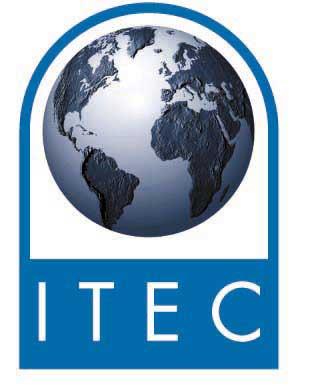 This course is designed to give a sound understanding of the body in wellness and also covers in outline the effects of the more common disorders. The main Textbooks for the Course is “An Introduction to Anatomy & Physiology” by Louise Tucker. No previous knowledge is required. This course is ideal for people who just want learn more about their body and its functions but it is specially designed for people who wish to undertake study in the area of holistic therapies. Each system of the body is covered in a lecture type format using visual aids. There is a strong emphasis on the Holistic view of the body.
This course is designed to give a sound understanding of the body in wellness and also covers in outline the effects of the more common disorders. The main Textbooks for the Course is “An Introduction to Anatomy & Physiology” by Louise Tucker. No previous knowledge is required. This course is ideal for people who just want learn more about their body and its functions but it is specially designed for people who wish to undertake study in the area of holistic therapies. Each system of the body is covered in a lecture type format using visual aids. There is a strong emphasis on the Holistic view of the body.
The examination by ITEC is optional. CPD points are given for persons undertaking this as a revision course.
Time • This course is run over a 12 week period.
- Class tuition time 50 hours
- Monitored home assignments require a further 100 hours study outside class.
- Allow a minimum of 150 hours in total.
a) Verification of completed Home Assignments.& Fulfillment of attendance requirements. Entitles the learners to a Certificate of completion of Study in Anatomy & Physiology. This allows learners to Study Reflexology with BEAMS Holistic Therapy College & Massage with The American Holistic Institute of Ireland.
b) Learners who have satisfied the requirements for (a) above have the option to undertake a 2.5 hour paper multiple choice questions set by ITEC. If successful the Candidate is awarded - The ITEC Certificate in Anatomy & Physiology Theory. As well as being recognized by BEAMS :
The ITEC Certificate is the recognized standard for a number of other therapies including
- The National School of Sports and Remedial Massage Therapy,
- Aromatherapy Diploma,
- Colour Diploma,
- Kinesiology,
- Massage Therapy as laid down the Irish Massage Association
- Plus many more.
Entry Requirements
- Candidates must have reached 18 years of age.
- Have an interest in the human body.
- Have time to devote to study and home assignments without overburdening self.
- Ability to communicate in writing.
- No previous qualifications or knowledge is required.
- Study of Anatomy & Physiology may be undertaken without sitting the exam.
